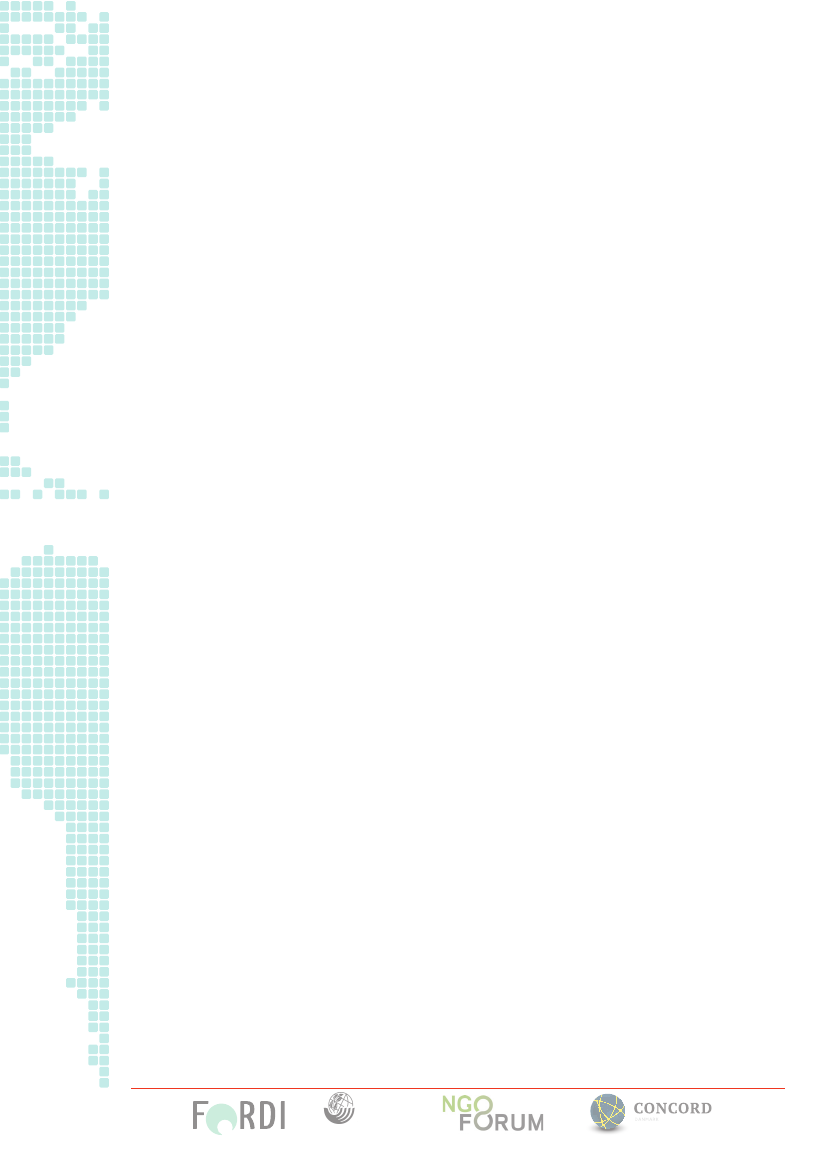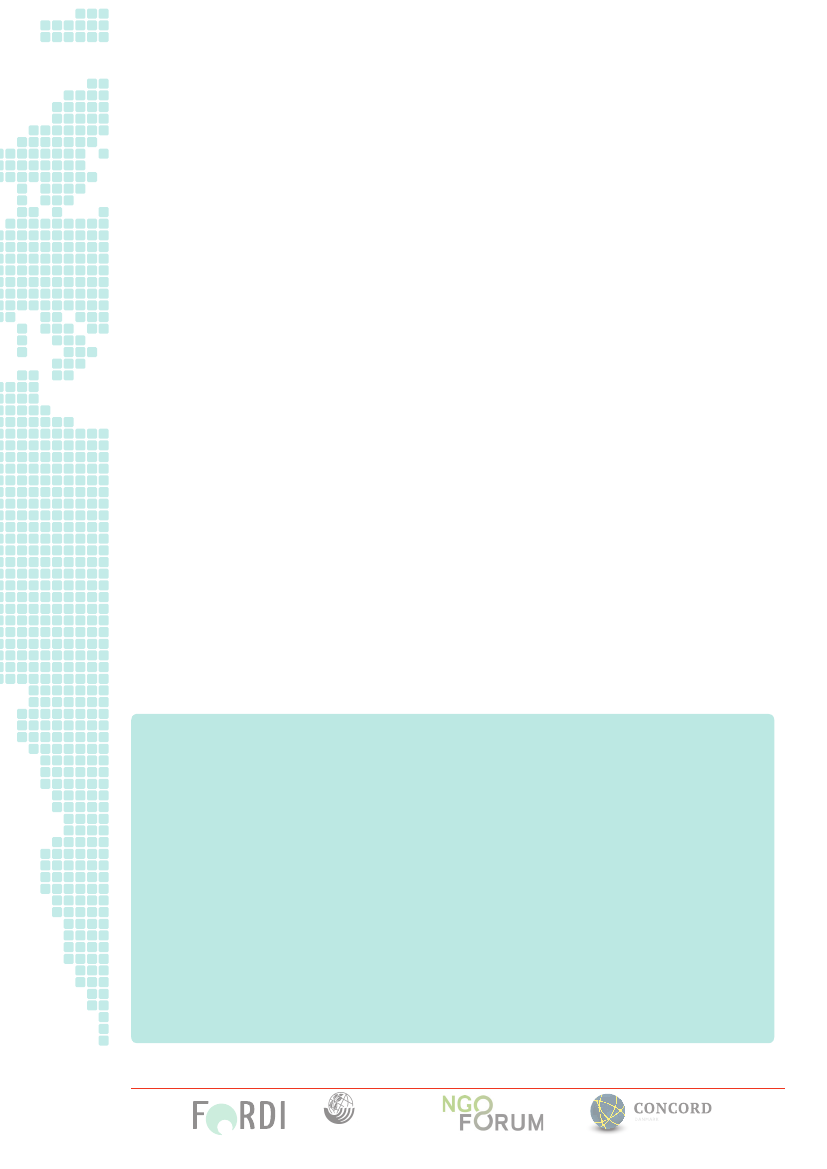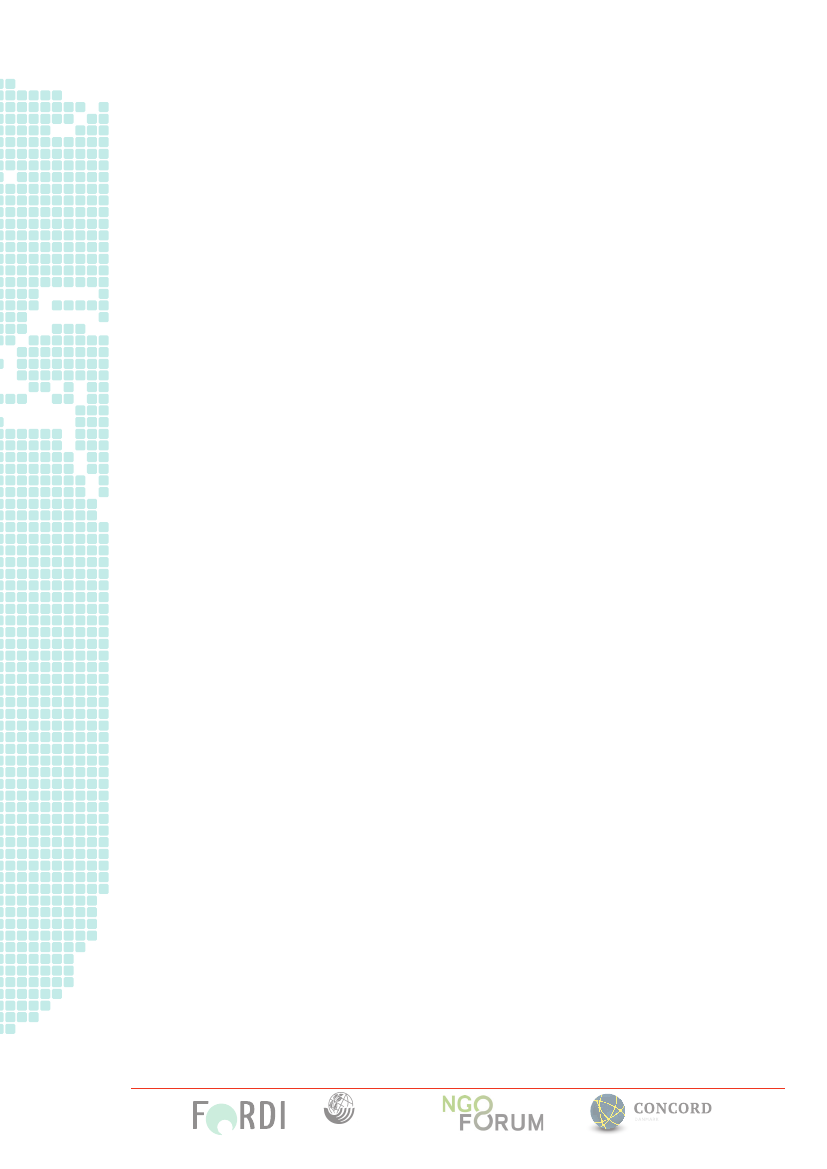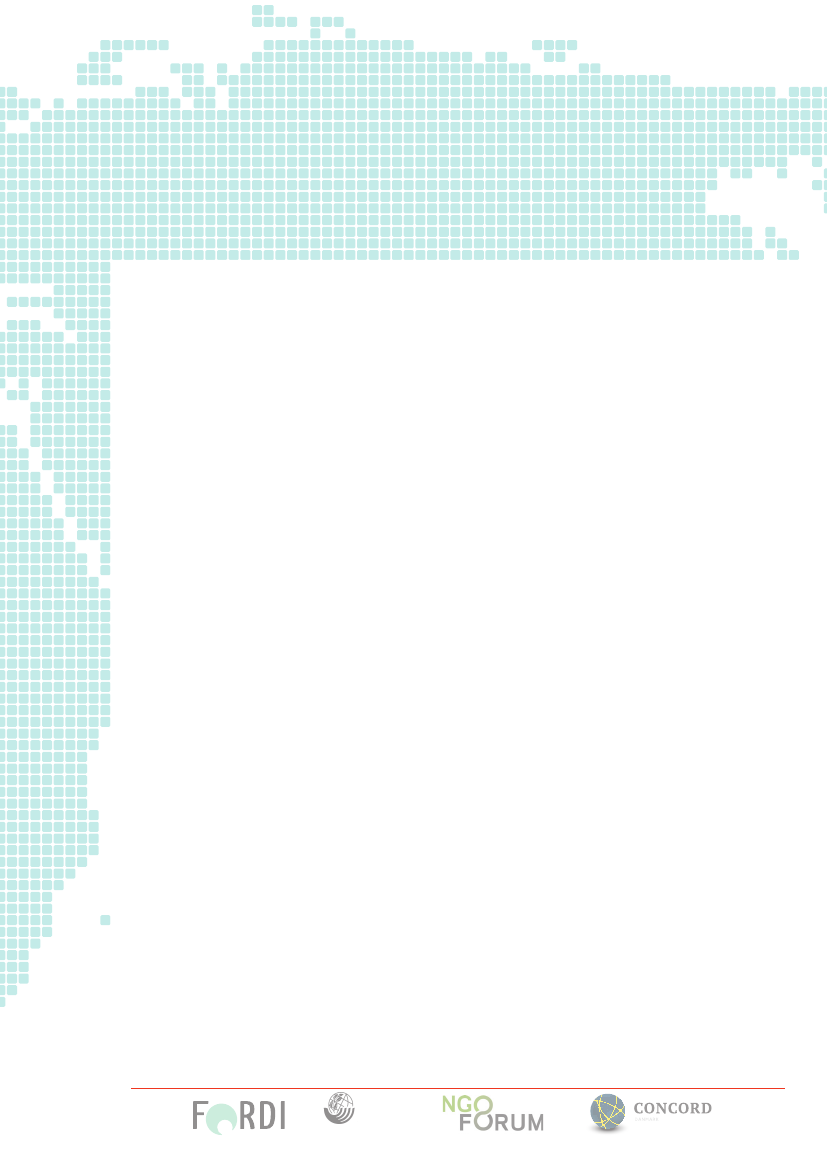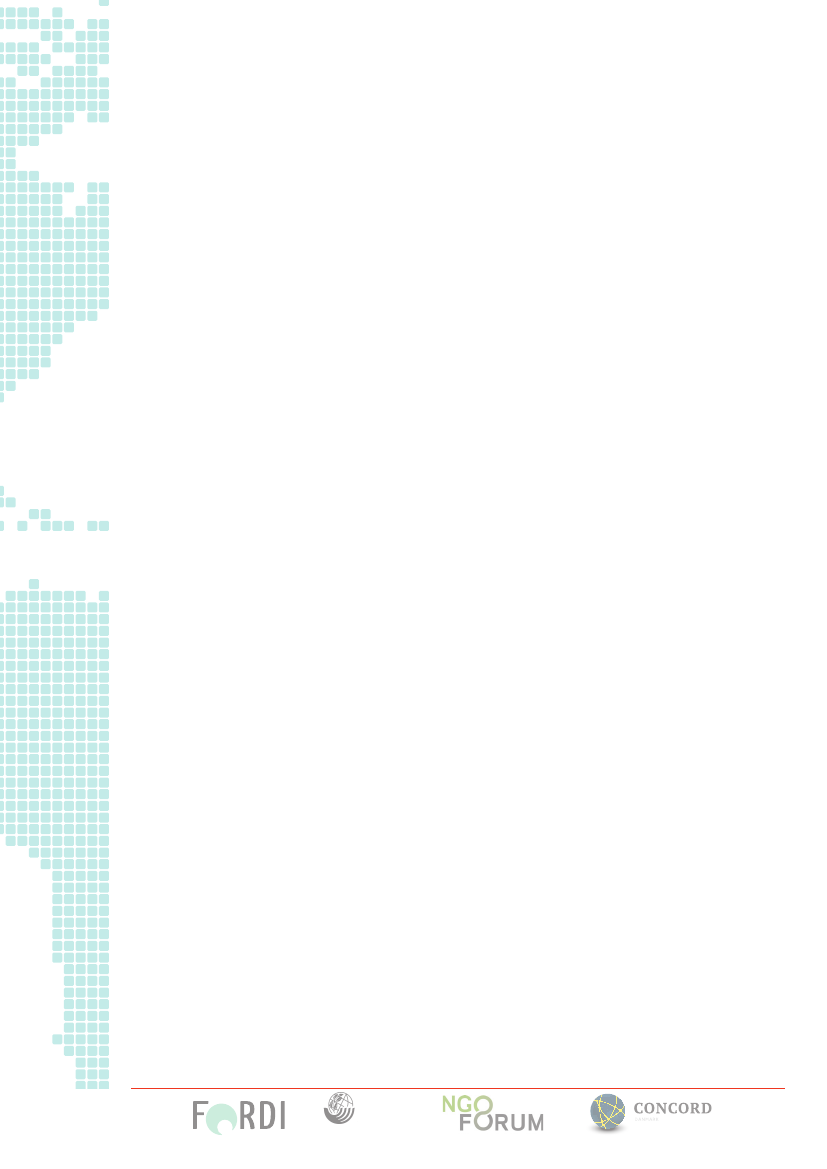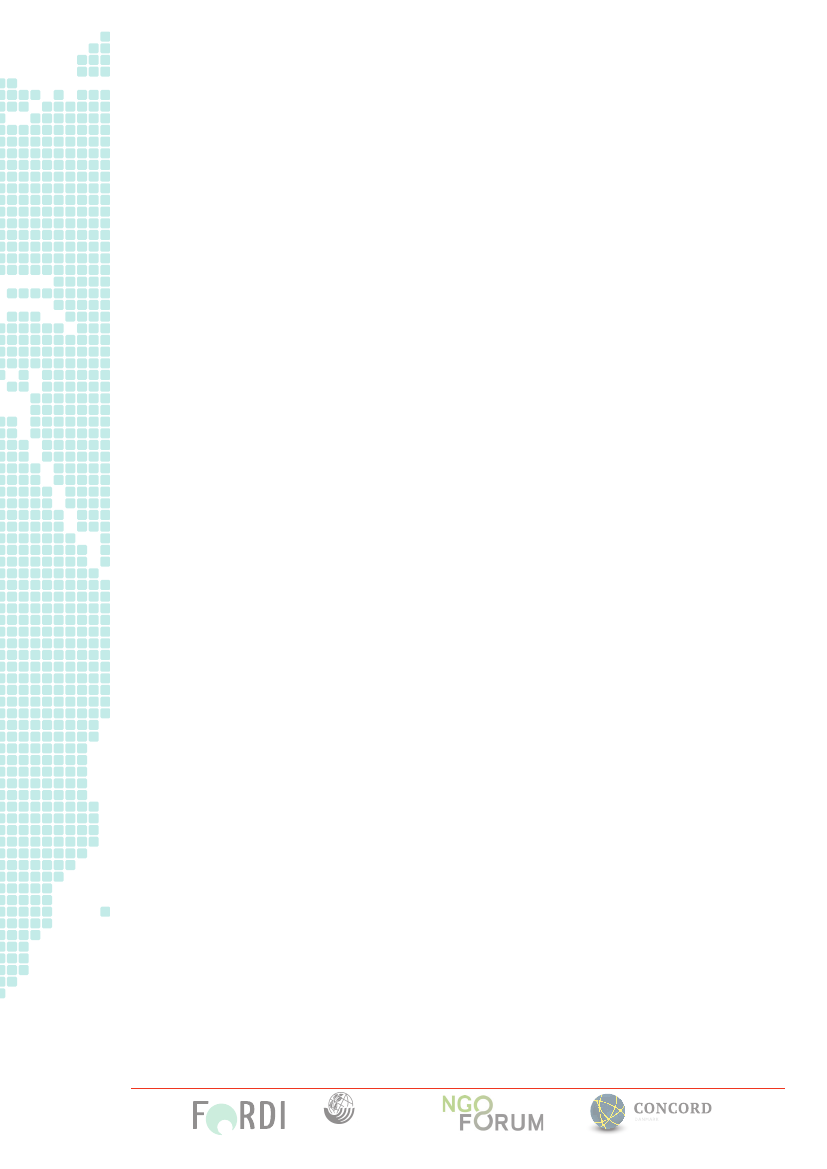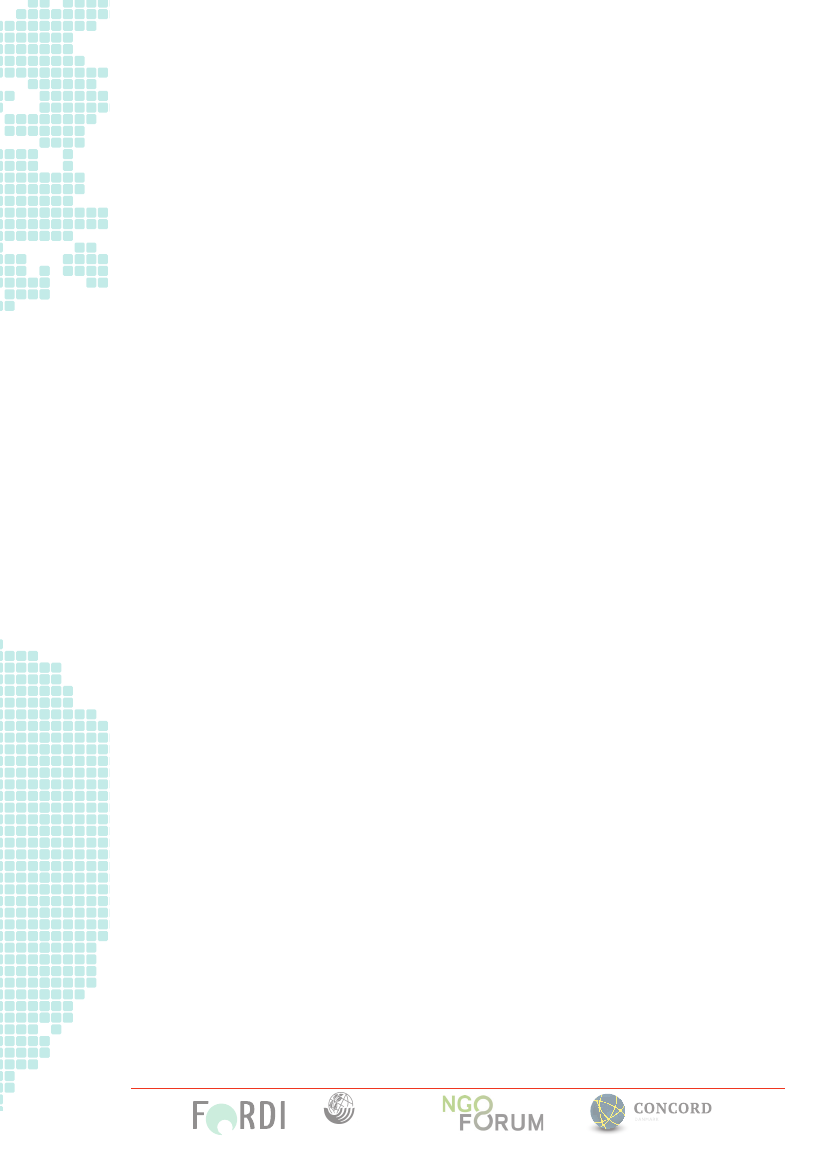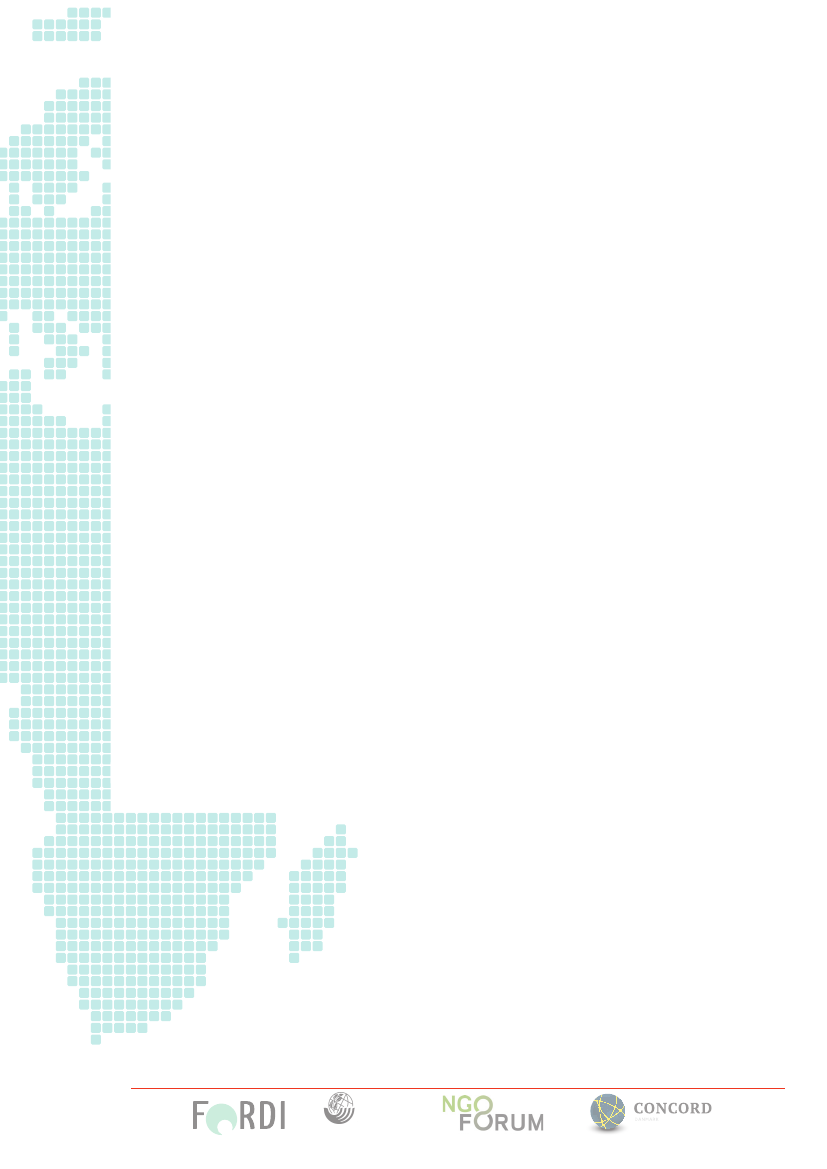Udenrigsudvalget 2012-13
URU Alm.del Bilag 123
Offentligt
GOALSSTAINABILIT YGLOBAL ND SUNEW MENT AR 2015AFTEVELOPFOR DEOPMENTAL DEVELEW GLOBENDA)ON THE NST-2015 AGAPERNPOALS(POA POSITIOTIONSABILITY GSTAINORGANISAAND SUSOCIETYNISH CIVILBY THE DA
SUMMARYWith the adoption of the UN Millennium Declaration in 2000, world leaders committed themselves to the mostambitious set of goals for human development ever proposed by the international community. They set the finish-ing line 15 years later and now, with a few years of that remaining, it is clear that the international community hasbeen able to bring about change for the better through cooperation and a common focus across thousands of dif-ferent endeavours all over the world. The number of extremely poor people in the world has halved, far more globalcitizens have access to clean water, and this alone has also greatly improved health.But these positive results do not represent the whole story. Progress is uneven within and across countries andregions, which is often due to discrimination and a lack of respect for the most basic rights, and almost 900 millionpeople are still chronically undernourished. Inequality has grown tremendously in many countries, and women sufferto a much higher degree than men; often it is the poorest women who experience the most extreme inequality. More-over, and most worrying of all, rapid climate change and depletion of the planet’s resources threaten to undermineprogress in rich and poor countries alike.If we are to prevent dramatic setbacks from putting a stop to the progress of global development, radical changemust take place. The development of a new set of UN development goals must be linked to the follow-up on theRio+20 Conference on Sustainable Development. Here, it was decided that the world shall also adopt a set of globalgoals promoting sustainability: the Sustainable Development Goals (SDG).Goals and decisions must point in a new direction. It has to be clear how the new goals will be reached, and whatthe responsibilities of the different actors are regarding the achievement of the goals. The new post-2015 goalsmust therefore be binding both on the global and national levels in order to ensure progress in every individual coun-try, depending on their respective local situations, priorities and capacities. This will ensure that the targets actuallycommit all countries to make the necessary changes for a more sustainable and socially equitable development.It is crucial that the new set of goals for the world post-2015 is determined by a process where the world’s poorestcountries and peoples have the decisive voice. Therefore the exact final goals shall not be suggested here.
1:8
The Danish 92 GroupForum for Sustainable Development
GOALSL YEW GLOBALAND SUSTAINABI5 ITNMENTAFTER 201OR DEVELOPF
However, the Danish Government needs to work to establish five essential and fundamental principles,which should be incorporated in the new set of goals:
1.The new goals must be global and combine development and sustainability.The goals must encompass those areaswhere the current 2015 goals have not been achieved, but the new goals have to go even further. They must addressglobal problems, which require urgent action by all countries: climate change, the depletion of natural resources, regu-lation of the international trading and financial systems, etc. Thus, the new global set of goals shall not only apply todeveloping countries, but must commit all world countries.
2.The new goals must adopt a rights-based approach to development;a change from the largely apolitical stance of the2015 goals, which ignore structural power issues. The new goals must ensure respect for human rights, the combatingof discrimination including gender discrimination and marginalisation, and secure poor people the right to participate inpolitical life.
3.The new goals must commit all world countries – not least the rich countries – to ensure consistency (policy coher-ence) in all policiesthat create the conditions for global development and sustainability. Since the 2015 goals wereadopted, the interdependence of the world’s countries has become ever more evident and it is clear that sustainabledevelopment requires more than effective aid. The post-2015 framework must therefore also include targets for howother key policy areas such as trade, agriculture and fisheries, resource extraction and tax etc. should be incorporatedinto the new set of goals.
4.The new goals must adopt a much more inclusive processin which civil society plays a key role in both the formulationand the implementation of the new set of goals. Political participation of civil society must be pursued and mechanismsthat clearly ensure the involvement of civil society must be established to ensure that the politicians are kept respon-sible for achieving the goals.
5.The new goals must ensure concrete, legally binding sources of finance for development and for the sustainabilityagenda,including a clear retention of the obligation on wealthy countries to provide a minimum of 0.7% of GNP in for-eign aid focusing on poverty reduction. Moreover, in order to ensure new financing for development, taxation of financialtransactions, the elimination of the use of tax havens by transnational companies, the withdrawal of unsustainablesubsidies, climate aid and conversions to a green economy must also be included.
BACKGROUNDThe UN Millennium Declaration of 2000 is a milestone in the commitment of all the world’s nations to a commondevelopment agenda. In the Declaration, which was adopted by 189 countries, the world leaders committed to a setof goals that should make the world a better place to live in for billions of people.Now it has been decided to formulate a new set of global development goals from 2015 which is both a continua-tion of the current Millennium Development Goals (MDGs) and at the same time the inclusion of a new global set ofsustainable development goals (SDGs) which formed part of the conclusions of the Rio+20 Summit. This is, there-fore, a unique opportunity to integrate poverty eradication, social justice, equal rights, education for all, and thegreen transition into a new set of global goals. In other words, this provides the opportunity to rectify shortcomingsof the current set of goals and establish conditions for global sustainable development for all.In the following five sections the above principles will be detailed. The position paper focuses on five major rec-ommendations, but apart from this there are also on a wide range of specific issues and concerns, which are vitallyimportant to prioritise in the further work towards the final post-2015 goals. This applies, among other things, tothe right to health and education, the right to hold governments and companies responsible for sustainable devel-opment, and the right to decide over own reproductive health.
2:8
The Danish 92 GroupForum for Sustainable Development
GOALSL YEW GLOBALAND SUSTAINABI5 ITNMENTAFTER 201OR DEVELOPF
CONTENT3467
1.The new goals must combine development and sustainability and commit all countries2.The new goals should adopt a rights-based approach3.The new goals must ensure Policy Coherence for Development (PCD)4.The new goals must ensure better inclusion of civil society
5.The new goals must include concrete commitments to ensure sources of finance for development 8
1. THE NEW GOALS MUST COMBINE DEVELOPMENT AND SUSTAINABILITY– AND COMMIT ALL COUNTRIESThe current 2015 goals do not sufficiently integrate sustainability, nor do they strike the necessary balance betweencrucial social, economic and environmental concerns.The world today is facing major challenges to ensure sustainable development that supports and respects the environ-mental resources and boundaries of the planet. The current development is depleting and destroying these natural re-sources that, we, as human beings, are dependent on to survive, leaving large numbers of the world’s population in hunger,poverty and precarious living conditions. Climate change, if not stopped, will inevitably undermine the development wehave already achieved and contribute to even more inequality between rich and poor than we see today. In order to enhanceand ensure sustainable development for all it is crucial that both developmental and environmental concerns, including theattempt to limit the effects of climate change, are merged in the new framework for sustainable development.But global sustainable development requires that all countries commit. The policies and consumption of every individualcountry impacts other countries and other peoples’ opportunities. The new global goals should therefore not just apply todeveloping countries, but to all countries. The new goals must commit all countries to ensure that their policies contributeto the achievement of time-bound and measurable results regarding poverty eradication and sustainable development.This implies that the rich countries must take the lead in the transition towards a sustainable social, economic and en-vironmental development, and at the same time provide support to the sustainable development of poor countries andcommunities.Global development cooperation after 2015 must take into account that global poverty today is largely due to unevenconsumption as well as uneven access to the world’s natural resources by the rich and the poor, and that this will also deter-mine the future. Continued overuse by the rich countries coupled with increased consumption and pollution by the largestemerging economies (if they follow in the rich countries’ footprints) will lead to insufficient environmental and natural re-sources for the poorest, leaving them powerless when it comes to ensuring sustainable development. Hence, a new frame-work for development must also include the principle of an equal right of all the world’s inhabitants to an environmentalspace – both in terms of resource consumption and pollution – within the capacity of the planet. Not least regarding climatechange, it is of vital importance that this rights-based approach is implemented. Climate change is having its most seriousconsequences for the poorest people, even though they have contributed least to it. Likewise, other countries’ pollution islimiting their opportunities for development. A rights-based approach with equal rights to resources and environmentalspace for all within the planet’s capacity is therefore essential to the new post-2015 framework for development.Such a rights-based approach must also ensure that overuse and pollution from some countries is coupled with and leadsto compensation to other poorer and less polluting countries and communities. This is crucial, especially regarding climateissues.The new framework for development must also address the demographic challenges. These challenges include thestrong population growth in certain world regions; especially Africa, the Middle East and South Asia, which is closely linkedto women’s limited access to reproductive health and rights. But also the increasing number of people in the middle-incomeclass globally is putting the use of natural resources under further pressure. These issues must also be addressed in thenew framework for development.
3:8
The Danish 92 GroupForum for Sustainable Development
GOALSL YEW GLOBALAND SUSTAINABI5 ITNMENTAFTER 201OR DEVELOPF
Recommendations for the Danish Government:∆That development and sustainability are merged into a set of universal goals for sustainable development for all worldcountries. All countries, rich and poor, must be involved, but according to the principle that the ‘broadest shoulders bearthe heaviest loads’. In other words, common but differentiated responsibility among nations of the world where the rich-est countries must take the lead.∆That the new framework for development takes the devastating consequences of climate change fully into consideration– and hence supports the solutions that are necessary, including reductions in emissions, climate adaptation and new andadditional financing.∆That the principle of equal rights to the ‘environmental and climate space’ within the capacity of the planet, for all inhab-itants of the world, is included as part of the new post-2015 framework. This principle applies both to the use of naturalresources and to pollution, including greenhouse gas emissions into the atmosphere. At the same time, this rights-basedapproach means that finance, for example for climate change, must be provided as compensation – and therefore as newand additional funds and not as part of the normal foreign aid budgets for development.∆That the goals reflect the right of individual countries and communities to manage their own natural resources, includingtheir right to access natural resources within the capacities of the ecosystems.∆That the private sector’s obligation to contribute to a sustainable development is ensured both in terms of environmen-tal/climate, economic, and social aspects and in relation to human rights.∆That the new framework for development addresses the challenges relating to population dynamics, including populationgrowth, and the increase of the global middle class. These challenges must be solved according to a rights-based ap-proach where reproductive health and women’s rights, and the fundamental right to equal opportunities for all humans,are essential points.∆That the new framework for development addresses and includes goals for sustainable development in key resourceareas such as water, fisheries, forestry, biodiversity, energy, agriculture and food security.∆That a set of global rights for access to basic natural resources such as water (through ratification and implementationof the International Water Convention), energy and a healthy environment, as well as the right to food security must beestablished. This can be done, for instance, by ensuring that the global agricultural production is not organised primarilyaround energy and animal production, and production of luxury goods.∆That the new framework for development includes the elimination of subsidies, for example in agriculture, fisheries andfossil fuels, which are damaging to the environment, the climate and the potential development for the poorest.∆That important, already existing declaration, agreements and conventions regarding sustainability are part of the futureframework for development, including the decisions of the Rio+20 process, the UNFCCC and CBD with the Aichi targets,the UN Declaration on the Rights of Indigenous Peoples, the Stockholm Convention, the Beijing Platform for Action, andthe International Conference on Population and Development (ICPD). Additionally, policies for development and vulner-ability to climate-related disasters, referring to the Hyogo Framework for Action (2005–15), must also be included in thenew framework for development.
4:8
The Danish 92 GroupForum for Sustainable Development
OALSW GLOBALAG D SUSTAINABILIT YNEENT N AFTER 2015R DEVELOPMFO
2. THE NEW GOALS SHOULD ADOPT A RIGHTS-BASED APPROACHAs well as the individual goals, the overall post-2015 framework must ensure respect for human rights, combat inequalityand discrimination, and ensure free, meaningful participation and inclusion in decision making processes and must ensureaccess to quality educations. Furthermore, they must promote the responsibility of states, international institutions andother important international players.The current MDGs are derived from the Millennium Declaration of 2000. Although the Declaration ensures a central posi-tion for international human rights, human rights were not, however, integrated into the current MDGs; combatting dis-crimination and a focus on the most vulnerable groups are virtually absent from the current goals. Moreover, there is scantreference to relevant human rights standards in the goals addressing service provision within health, education and othersocial sectors. This has led to a situation where large numbers of men and women, living in poverty and fragile situations,are kept in poverty and are excluded from basic human rights. Women are harder affected than men and often, the poorestwomen experience the most serious violations of basic human rights.Civil and political rights are equally absent from the current goals, and thus they do not reflect the Vienna Declaration of1993, which specifically stresses the universality and indivisibility of human rights. The problem of state violence in repres-sive societies against women, children and young men is not addressed as part of the goals either. This has shifted thefocus of the importance of rights onto different forms of freedom and to the rule of law in poverty reduction. In recent yearswe have witnessed how the poor and the organisations advocating for their rights have experienced a shrinking space forpolitical manoeuvre. In a number of countries legislation and administrative rules have been introduced which have severelyreduced the possibilities for poor people to claim their rights.Practically all the world’s nations have ratified the UN conventions on human rights. They must provide a common point ofreference for new post-2015 goals. The realisation of all rights, civil and political as well as social and economical, is crucial fora future sustainable development. The realisation of rights is central for poor people to be able to hold their elected leadersaccountable for a sustainable use and a just distribution of national resources. Three out of four poor people now live in mid-dle-income countries, and states therefore need to enhance their capacity to redistribute wealth and to ensure rights. Thepoor need support in their struggle for their rights, whether they live in the poorest, the middle-income or the rich countries.
Recommendations for the Danish Government:∆Respect for and promotion of the UN human rights conventions, standards, norms and instruments, to ensure their inclu-sion within the new goals.∆That principles of responsibility, transparency, participation and non-discrimination are effectively integrated into the newgoals, including equal access to fulfilment of rights irrespective of gender, age, ethnicity and religion.∆That education is being acknowledged and addressed as a human right, and that the impact of education, which supportsother development goals, is being emphasised and integrated in the new framework for development.∆That goals on service delivery, including education and health, include clear references to relevant human rights standards.∆That the right to participation, including access to information and available mechanisms, and frameworks for meaningfulcitizen – and civil society inclusion are integrated in the new goals.∆To prevent NGO-legislation which limits the possibility of working for poor people’s rights. This might for instance be pre-vented by establishing regular and continuous consultations of donors, governments and representatives of civil society.∆That promotion of the duty of the international community to ensure participation, rule of law, transparency, responsibil-ity and effective complaint mechanisms is integrated into the new set of goals.∆That states, as well as the international community, ensure that private corporations, investors and NGOs protect humanrights in the countries where they operate.∆That goals are defined in areas which have particular importance for vulnerable and marginalised groups as well as vio-lence against civilian populations in conflict-ridden situations including goals that address violence against women andchildren and young people. Furthermore, protection must be ensured in situations without conflicts where violence andtorture are still big risks (in prisons, at police stations and in slum areas).∆That quantitative and qualitative indicators, as well as segregated demographic data, are developed to provide a baselinefor effective monitoring of fulfilment of rights for the vulnerable and marginalised.∆That national goals, indicators and follow-up be developed in consultation and dialogue with parliaments, civil societyorganisations and other relevant actors.
5:8
The Danish 92 GroupForum for Sustainable Development
GOALSL YEW GLOBALAND SUSTAINABI5 ITNMENTAFTER 201OR DEVELOPF
3. COHERENCE FOR DEVELOPMENT (PCD)The new goals need to ensure policy coherence for development across the many policies, which affect the structural con-ditions for global development and sustainability. Since the MDGs were agreed upon, the mutual interdependence betweenthe nations of the world has increased dramatically. It is therefore more necessary than ever to ensure that world leadersare held accountable that development, trade, agricultural, fishery, investment, resource extraction and tax policies arecoherent with development objectives.The principle of PCD is enshrined in the EU Lisbon Treaty (Article 208), and in the new Danish law on development coop-eration. But so far there are no effective mechanisms in place to ensure that these legal commitments are translated intopractice. The new post-2015 framework constitutes a unique opportunity to agree on clear goals regarding this translationof the coherence principle into practice in the international political and economic system.In concrete terms, this implies that the post-2015 framework should include targets on how these new goals are realised,thereby addressing structural causalities between national and regional policies and the global conditions for developmentand sustainability. As recommended in the UN ‘System Task Team on the Post-2015 UN’, this should happen through theestablishment of a set of sub-goals within specific policy areas, serving as ‘enablers’ in order to reach more overall end goalssuch as, for example, poverty eradication.1Examples of such enablers could include tackling tax evasion, trade barriers, agricultural subsidies, price volatility on rawmaterials, fishing quotas in international waters and the management of renewable natural resources at national as wellas international level, etc. Although the concrete sub-goals will ultimately depend upon which overall end goals are estab-lished, the general principle needs to be established already at this early stage in order that it can function as a cornerstonefor the development of the framework. At present it is already possible to point to a number of specific policy areas andrelated sub-goals that could be monitored through internationally recognised data gathering and measuring techniques.
Recommendations for the Danish Government:∆That the principle of policy coherence for development and sustainability be established as a binding prerequisite in imple-menting the new post-2015 goals.∆That a standard for institutional mechanisms is included, ensuring that the principle of policy coherence is integrated intonational and regional decision making procedures (e.g. OECD’s ‘Building Blocks for Policy Coherence for Development’, EUguidelines for impact analysis, etc.).∆That indicators are integrated into an array of important enablers in the new framework, such as:∆Capital flight (can be measured globally and regionally as well as nationally).∆Tax havens (can be defined).∆Agricultural subsidies (can be measured through the OECD PSE index and are already included in the current MDG8).∆Trade barriers (can be measured through WTO/G20 or through global value chain analysis).∆Price volatility on essential food and raw materials (can be measured through FAO price index and price volatility index).∆Natural resource consumption (can be measured through establishment of planetary boundaries, ILUC, sustainablegovernance indicators (SGI) etc.∆Access to land (can be measured in countries which have signed up to and implemented UN standards within the area).∆Price volatility (can be measured through monitoring of national and regional food storage capacity and regulation ofspeculative investments in natural resource derivatives).∆Corruption (can be measured through corruption indexes.)∆Population dynamics (can be measured through indicators from ICPD, PoA).∆Access to life-saving medicine and health facilities.∆Access to quality educations for all.1 “To realize the future we want for all, a high degree of policy coherence at the global, regional, national and sub-national levels will be required. The core set of‘development enablers’ can be identified as a guide for such policy coherence” UN System Task Team on the Post-2015 UN (2012): Realizing the future we wantfor all: Report to the Secretary-General, p. i.
The Danish 92 GroupForum for Sustainable Development
6:8
GOALSL YEW GLOBALAND SUSTAINABI5 ITNMENTAFTER 201OR DEVELOPF
4. THE NEW GOALS MUST ENSURE BETTER INCLUSION OF CIVIL SOCIETYIn the formulation and in the monitoring of the implementation of the current MDGs, the inclusion of poor countries andpopulations has been limited. The current goals were drafted by a working group within the UN without any further consul-tation process at either government or civil society level.Simultaneously, global inequality has increased, worldwide between the richest and the poorest countries and internallywithin particular countries. The significant economic growth which many countries have experienced has often led to afurther marginalisation of poor populations. Inequality has increased internally, and ‘trickle-down effects’ in the form ofimproved job prospects and improved social services have been modest.The future goals must address the global and national challenges in a satisfactory manner, ensuring democratic owner-ship in the different countries. Thus, it is of vital importance that their formulation is being undertaken in a much moreinclusive process where the voices of the poor and marginalised are heard far more. Likewise, frameworks and mechanismsmust be established to ensure that populations and civil societies are empowered to hold political leaders accountable forthe fulfilment of goals they commit themselves to is being integrated and implemented in national action plans. This notonly entails support to civil society organisations, but also requires that the international community globally supportsdemocratisation processes in individual countries. In this connection the global community faces a special challenge in en-suring better governance in fragile situations and in contexts which may have destabilising effects beyond national bordersas well as internally.Poor populations are often poor precisely because they do not have any voice and are powerless when they attempt toclaim legitimate and internationally-acknowledged rights. A number of international initiatives have been taken to ensurethat a poverty eradication agenda gets a high priority within the post-2015 framework. These initiatives include the ‘Beyond2015’ campaign, the CAP (Global Campaign against Poverty), CIVICUS, the INGO group, the new BetterAid/Open Foruminternational Platform (CPDE) and the International Forum of National Platforms of Development NGOs (IFP/FIP). It is,however, important that it is not only at international level that civil society is heard; the strengthening of local and nationalcivil society and their inclusion in poverty reduction policy formulation should be seen as a goal in itself.Moreover, it is important that civil society initiatives are supported and that governments and international organisations aswell as businesses show a willingness to enter into dialogue with these. It is thus essential that civil society consultation notbe reduced to a legitimising exercise, carried out primarily in order for decision makers to claim that everybody has been heard.In order to avoid involvement being reduced to such a legitimising exercise, civil society involvement must not be solelylimited to policy formulation. Civil society should be just as involved in implementation and monitoring of future goals. Thisshould be done by including the representatives of civil society in working groups and forums working with the planning,monitoring and evaluation of the new goals. This will promote and ensure real democratisation of the new framework fordevelopment, thereby securing a further degree of inclusion of the poor into the new framework.
Recommendations for the Danish Government:∆That the Danish government position on the post-2015 agenda is formulated in an open and transparent process, in dia-logue with relevant civil society organisations in Denmark as well as in our partner countries.∆That the Danish government ascertains that civil society is involved both locally, nationally and internationally to securelegitimacy and democratic ownership.∆That civil society concerns are supported and strengthened in the relevant forums within the EU and UN.∆That civil society organisations are given an important role in implementing and monitoring Danish initiatives within thepost-2015 framework and in the development of relevant national laws, policies and plans.∆That international development assistance consistently supports democracy and popular involvement in developing coun-tries as well as in the international community through support to civil society, whose strength should be seen as a goalin itself.∆That education is being acknowledged as prerequisite for humans’ ability to function as democratic citizens, which is es-sential for ensuring good governance and sustainability.
The Danish 92 GroupForum for Sustainable Development
7:8
GOALSL YEW GLOBALAND SUSTAINABI5 ITNMENTAFTER 201OR DEVELOPF
5. THE NEW GOALS MUST INCLUDE CONCRETE COMMITMENTSTO ENSURE SOURCES OF FINANCE FOR DEVELOPMENT.Aid to poor countries does not play the international role that it used to, compared to other international capital flows.It is therefore crucial to establish binding agreements on finance for development covering a variety of sources, and estab-lished along with initiatives to ensure policy coherence on policies that can counteract such financing.The Danish government should take their point of departure in the UN process on ‘Financing for Development’,2which wasinitiated as a result of the current goals of the MDG8 with the objective of ensuring financing of the other goals.
Recommendations for the Danish Government:∆Aid:That all rich countries meet their commitment of at least 0.7% of their GDP, and that the Danish government will getback to its 1% of GDP contribution. This aid should be focused on poverty reduction. Furthermore, the rich countries mustprovide new and additional funding to address climate change.∆Mobilisation of national resources:that, at an international level beginning with the EU, regulation is introduced ad-dressing capital flight from developing countries. This regulation should enable national taxation, which could providethe basis for financing development. Key actions include increasing transparency in the accounts of international corpora-tions, transparency in tax havens and exchange of tax information between countries. Developing countries, furthermore,should be provided with support to increase their capacity to strengthen policies, legislation and administration to ensurea stronger basis for taxation, especially in the extractive industries.∆Innovative financing:That mechanisms to finance multilateral initiatives to combat poverty and sustainable develop-ment are developed. Beginning at European level, these could initially include taxation of certain international financialtransactions, but could equally include tax on air traffic, bunker oil, road pricing etc.∆Debt:That a fair and independent, international system for debt alleviation is developed. This should establish proceduresfor the writing off of old debt, as well as institute binding norms for responsible lending. Denmark should start this pro-cess by writing off old, illegitimate debt without accounting this as part of the current development aid.∆Trade:That a global trade regime is developed, where the poorest and most fragile countries are given preferential status,which increases the possibility for them to develop productive sectors, which again would contribute to the financing of asustainable development. Coherence within Danish and European trade policy is an important point of departure.∆Foreign direct investments:That foreign investments in developing countries are only supported to the extent that theypromote sustainable and pro-poor development.∆Green and sustainable economy:That all countries – both rich and poor – establish green and sustainable economies,which through adequate policies and framework conditions for both the public and the private sectors, promote a globalsustainable development.2 ‘Financing for development’, http://www.un.org/en/development/desa/financial-crisis/development.shtml
8:8
The Danish 92 GroupForum for Sustainable Development
